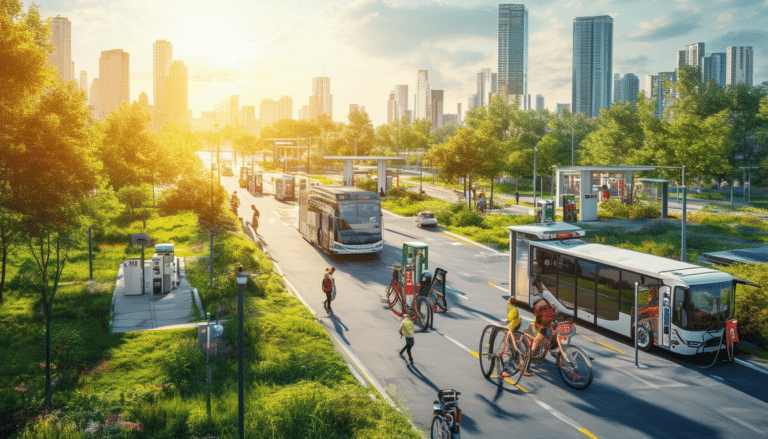El Ministerio de Transportes gives the green light to an ambitious strategy to reduce electricity consumption and emissions on the Road Network by 50% by the year 2030

The Ministry of Transport has approved an ambitious strategy aimed at reducing 50% of the electricity consumption and emissions generated by the State Road Network by the year 2030. This initiative seeks to advance towards a model of sustainable mobility, decreasing dependence on fossil fuels, and is based on the modernization of infrastructures and the adoption of more efficient technologies. With a planned investment of 457 million euros, various energy efficiency measures will be implemented that will benefit both the environment and society as a whole.
The Ministry of Transport and Sustainable Mobility has approved an ambitious strategy that aims to reduce 50% of electric consumption and the emissions generated on the State Road Network by the year 2030. This initiative has an investment of 457 million euros and seeks to promote energy efficiency and reduce dependence on fossil fuels through the modernization of infrastructures and vehicle fleets.
Significant investments for sustainable change
With the aim of boosting energy efficiency, a significant investment has been planned to implement more modern systems. The strategy includes not only the reduction of electric consumption but also the sustainable transformation of the vehicle fleet used on the Road Network.
Key components of the strategy
The publication of the document related to this strategy in the Official State Bulletin coincides with the fulfillment of one of the milestones committed to the European Commission. This milestone is part of component 6, which focuses on sustainable, safe, and connected mobility.
Modernization of the lighting system
One of the most notable measures is the modernization of the lighting system on the roads, which will involve replacing sodium vapor lamps with LED lighting, as well as implementing intelligent management systems to regulate brightness according to the presence of vehicles and people. These measures promise an estimated energy saving between 50% and 80%.
Optimization of energy consumption in tunnels
Currently, the annual electric consumption of the road network is 146 GWh, with 73% corresponding to tunnels. This results in an annual cost ranging from 30 to 40 million euros, highlighting the urgent need to optimize these systems to respond to the sustainability strategy.
Ongoing projects for effective transformation
There are numerous projects underway aimed at modernizing lighting systems and prioritizing those that will be financed by the Recovery Plan. In addition, there are plans to implement a new consumption management system and renew the General Directorate of Roads’ own vehicle fleet.
Goals for the future
One of the firm goals is that by 2030, 55% of the fleet will be electric or hybrid, which will require an investment of approximately 10 million euros. This transformation is essential to advance towards a more sustainable and cohesive model within the field of mobility.
Commitment to sustainability in contracts
The energy efficiency strategy also encompasses measures that promote sustainability in companies dedicated to the maintenance and operation of the road network. Sustainability clauses have been incorporated into the bidding documents, aimed at improving energy efficiency in these sectors.
Action Plan to meet objectives
In order to effectively execute the objectives specified in the strategy, the General Directorate of Roads is developing an Action Plan. This plan will include the constant review and update of the investment required to implement the various projects, thus ensuring effective implementation of the proposed measures.
Analysis of the current situation and future projections
The strategy proposes a comprehensive analysis of the current consumption situation and presents ambitious medium- and long-term objectives. These projections not only contemplate consumption reduction but also an integrated approach that encompasses the general lines of the measures to be implemented and a global cost estimate, which will be primarily financed by Next Generation-EU funds.
Energy Efficiency Strategy 2030
The recent approval by the Ministry of Transport of an ambitious strategy to reduce 50% of electric consumption and emissions in the Road Network marks a significant milestone in the country’s sustainability policies. This strategy occurs within a global context demanding decisive actions in response to the climate crisis, where a proactive approach becomes a necessity.
The investment of 457 million euros allocated for energy efficiency and modernization of infrastructures is a crucial step towards reducing dependence on fossil fuels. This financial injection will promote the implementation of more advanced technologies, including LED lighting systems and the transformation of the vehicle fleet towards electric and hybrid options.
The impact of these measures is reflected not only in energy savings, estimated between 50% and 80% compared to traditional lighting, but also in a significant reduction of the electric bill of the road system. With an annual consumption exceeding 146 GWh, achieving lower energy demand goals will have positive repercussions both economically and environmentally.
Additionally, the development of an Action Plan will allow for more effective resource management and maintenance of the implemented policies. This integrated approach aims not only to meet the objectives set for 2030 but also to create a sustainable model that can serve as a benchmark in mobility and infrastructure management in the future.





